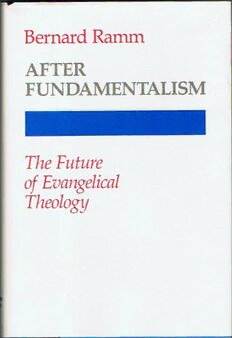
After fundamentalism: The future of evangelical theology PDF
Preview After fundamentalism: The future of evangelical theology
ISBN □-□L-Dt.b7fiT-3 >$14-15 This major statement by a respected scholar offers evangelical theologians a way to build a coherent theology out of the modernist-fundamentalist con troversy that has fragmented contemporary Chris tian thinking. Bernard Ramm argues that evan gelical theology, to be taken seriously in the twen tieth century, must be able to come to terms with historical criticism, scientific developments, and human progress, while retaining faithfulness to Scripture. Central to the discussion in After Fundamental ism is the inability—until now—of theologians to come to terms with the Enlightenment of the eigh- , teenth century. Orthodox theology has not, so far, recovered from the shattering experience of that cultural watershed in human history. Carefully, illuminatingly, Ramm discloses how Karl Barth’s theology, when properly understood, serves as the best, and most consistent, model to come to terms with the Enlightenment. Barth, as After Fundamentalism so clearly demonstrates, found the balance point from which theology can grow beyond the unresolved controversy that began over two centuries ago. “Barth is a child of the Enlightenment wher ever it represents true learning and genuine prog ress in knowledge,” Ramm points out. “He is a severe critic of the Enlightenment in its pretensions to final truth, to its perfect harmony with reason, and its criticism of orthodox Christianity.” Dis tilling the essence of Barth’s thought and method ology, Ramm formulates a unifying method for doing a Bible-centered theology that does not deny the modern world or deny reason. After Fun damentalism embodies a genuine, valid working hypothesis for evangelicals to interact with the humanity of Scripture and biblical criticism in general. (continued on back flap) □1143763 AFTER FUNDAMENTALISM .. ■y,.r vj* ^■- „ : jv , Ji r .■ ^ ■ " m J ! . 1 ■ ,-J- ■■' ---J ■-1 :‘^ .V .!•■;■ :■: .=> - _-T--F^. ; \&Tr , T-. >■«■■: --: r ..J! ' f e e & “V r>i^. .. ■■ ‘‘/ i p ■§;'■'■'r>;v t* T . . _ j .! . . J’iT Jf® ' u 1 . .*_____ . “■^r^---1 ■ t'-> ^.L-=o -:vv v- u r A-v! 3fc M .-. Jj y • --,: Ti iS - =-^-" AFTER FUNDAMENTALISM The Future of Evangelical Theology Bernard Ramm jl lE 1817 HARPER & ROW, PUBLISHERS, SAN FRANCISCO Cambridge, Hagerstown, New York, Philadelphia London, Mexico City, Sao Paulo, Sydney After Fundamentalism: The Future of Evangelical Theology. Copyright © 1983 by Bernard Ramm. All rights reserved. Printed in the United States of Amer ica. No part of this book may be used or reproduced in any manner whatsoever without written permis sion except in the case of brief quotations embodied in critical articles and reviews. For information ad dress Harper & Row, Publishers, Inc., 10 East 53rd Street, New York, NY 10022. Published simultaneous ly in Canada by Fitzhenry & Whiteside, Limited, To ronto. FIRST EDITION Designed by Donna Davis Library of Congress Cataloging in Publication Data Ramm, Bernard L„ 1916- AFTER FUNDAMENTALISM. Bibliography: p. 211 Includes index. 1. Theology—Methodology. 2. Evangelicalism. 3. Enlightenment. 4. Barth, Karl, 1886-1968. 5. Modernist-fundamentalist controversy. I. Title. BR118.R33 1982 230'.044 82-47792 ISBN 0-06-066789-3 83 84 85 86 87 10 9 8 7 6 5 4 3 2 1 Contents Preface vii 1. The Quest 1 2. My Problem 11 3. Getting More Specific 29 4. Preaching 50 5. Apologetics 57 6. History 72 7. The Word of God 88 8. The Humanity of Holy Scriptures 101 9. The Divinity of Holy Scriptures 116 10. The Christological Scriptures 126 11. Freedom 135 12. Ethics 144 13. The Doctrine of Man 151 14. The Existence of God 158 15. Universalism 165 16. Humanism 173 17. Christological Eschatology 181 18. The Laughing Barth 193 Appendix 1. Reservations About Barth's Theology 199 Appendix 2. Lewis Sperry Chafer and Karl Barth 206 Bibliography 211 Index 219 v r;* -«< yr •. •T • "fIJ/o;»f' .• 7:'- mr ~~ ; y* _ . =V S^-U - , -• ^^'■'. ,>i>>-L. V*. I ".- ■ - ’-V" ^ 7- --v ’ '* -c * - ^ f l p ^ ^ ' •; - ■ « ■ - " - ‘>^r. "ii^ '-/; - "S’ - S ^ % S - W ;.-. >'vc-}r?-'’4.*^ ' * v *• " ^' ■->• ^ -~ ^ + . yr^- - ^ •.-■*- -j *-g> v _ - > -V «•- . ;: rr-r - ■ vf Ij’S'- -v i S tS :- v" . - ' ■ > - . . _- w ., r?o» • .- /. ■- , v -> r ■|' •■ V’
